二宾语从句
第9讲.宾语从句(二).教师版

内容 基本要求宾语从句(二) 1. 否定转移2. 宾语从句时态和语序 新概念二 第23课There be 句型宾语从句(二)3. 宾语从句的否定转移主句的谓语动词是think, believe, imagine, suppose, consider, expect, fancy, guess 等,并且主句的主语是第一人称而且为一般现在时,从句的否定词一般要转移到主句上来,其反义疑问句一般与宾语从句一致。
如:I don’t think he will come to my party.而不能说成I think he won’t come to my party. 我认为他不会来我的舞会。
I don’t believe that man is killed by Jim, is he? 我认为那个人不是Jim 所杀的,是不是? 如果宾语从句中有某个含有否定意义的形容词或副词,其反义疑问句要用肯定形式。
We find that he never listens to the teacher carefully, does he?我们发现他从来不仔细听老师讲课,是不是?4. 宾语从句的时态和语序当主句为现在时或将来时的时候,宾语从句的时态一般不受主句的时态所影响。
1)当主句为过去时的时候①从句用一般过去时或过去进行时表示与主句谓语动词动作同时发生。
如:I only knew he was studying in a western country, but I didn’t know what country he was in. 我只知道他当时在西方的一个国家读书,可不知道是哪个国家。
He asked me if I was reading the story The Old Man and the Sea when he was in. 他问我他进来的时候我是否正在读《老人与海》。
②从句过去完成时表示该动作发生在主句谓语动作之前。
Unit2语法宾语从句
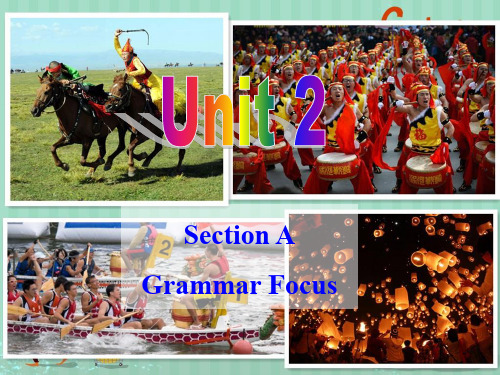
I didn’t know
Should we study hard?
He told me I guessed
Can she sing?
She wanted to know Has she left? Mary asked me
Did you think
Do you like eating out?
I remembered
Object clauses with that 由that引导的宾语从句
注:that 在句中无词汇意义,在从句中不充 当成分,在口语当中往往省略。
1. I hear (that) _h_e__w_i_ll_b_e__b_a_c_k_i_n__a_n_h_o_u_r_.
2. He said (that) _h_e__m_i_s_se_d__u_s_v_e_r_y__m_u_c_h__. 3. The teacher told us (that) __th_e__e_a_r_th__m__o_v_es_ __a_r_o_u_n_d__t_h_e_s_u_n__.
3.改变时态(向后推)
Does he eat fruit? Does Bob’s friend watch TV?
练一练: I don’t know I wonder He asks me
Are they friends? Should I take my temprature ? Does Tom leave Beijing?
She wanted to know When will the train leave?
Mary asked me
What will we eat?
Did you know
Where can I go?
关于英语里宾语从句的用法
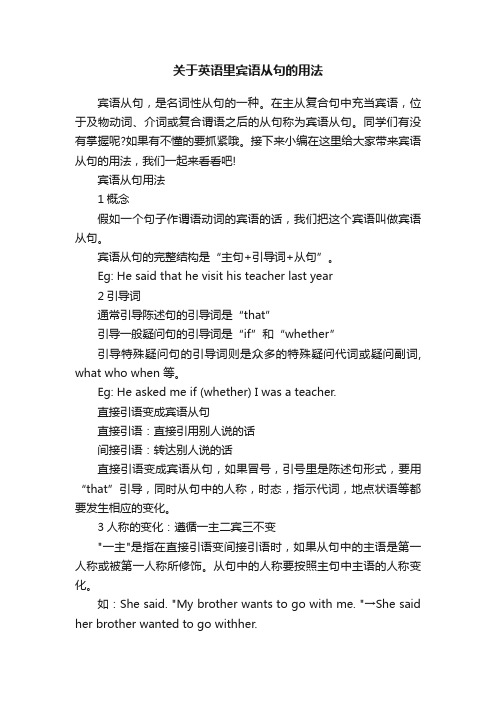
关于英语里宾语从句的用法宾语从句,是名词性从句的一种。
在主从复合句中充当宾语,位于及物动词、介词或复合谓语之后的从句称为宾语从句。
同学们有没有掌握呢?如果有不懂的要抓紧哦。
接下来小编在这里给大家带来宾语从句的用法,我们一起来看看吧!宾语从句用法1概念假如一个句子作谓语动词的宾语的话,我们把这个宾语叫做宾语从句。
宾语从句的完整结构是“主句+引导词+从句”。
Eg: He said that he visit his teacher last year2引导词通常引导陈述句的引导词是“that”引导一般疑问句的引导词是“if”和“whether”引导特殊疑问句的引导词则是众多的特殊疑问代词或疑问副词, what who when 等。
Eg: He asked me if (whether) I was a teacher.直接引语变成宾语从句直接引语:直接引用别人说的话间接引语:转达别人说的话直接引语变成宾语从句,如果冒号,引号里是陈述句形式,要用“that”引导,同时从句中的人称,时态,指示代词,地点状语等都要发生相应的变化。
3人称的变化:遵循一主二宾三不变"一主"是指在直接引语变间接引语时,如果从句中的主语是第一人称或被第一人称所修饰。
从句中的人称要按照主句中主语的人称变化。
如:She said. "My brother wants to go with me. "→She said her brother wanted to go withher."二宾"是指直接引语变间接引语时,若从句中的主语及宾语是第二人称。
或被第二人称所修饰。
从句中的人称要跟引号外的主句的宾语一致。
如果引号外的主句没有宾语。
也可以用第一人称。
如:He said to Kate. "How is your sister now?"→He asked Kate how her sister was then"三不变"是指直接引语变间接引语时。
第二个宾语从句的that
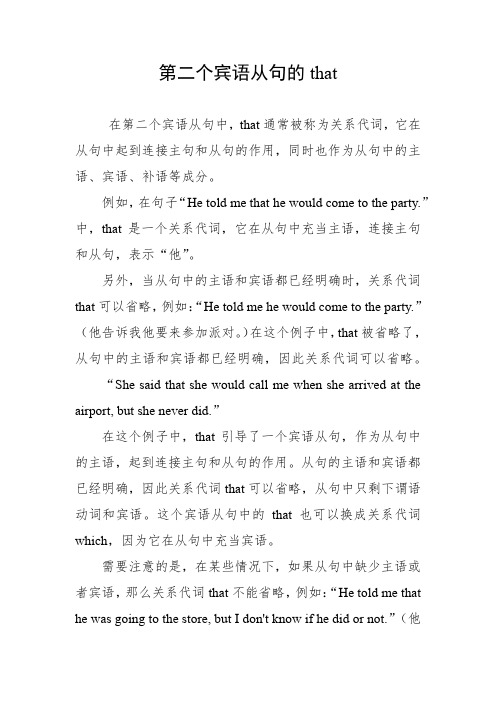
第二个宾语从句的that
在第二个宾语从句中,that通常被称为关系代词,它在从句中起到连接主句和从句的作用,同时也作为从句中的主语、宾语、补语等成分。
例如,在句子“He told me that he would come to the party.”中,that是一个关系代词,它在从句中充当主语,连接主句和从句,表示“他”。
另外,当从句中的主语和宾语都已经明确时,关系代词that可以省略,例如:“He told me he would come to the party.”(他告诉我他要来参加派对。
)在这个例子中,that被省略了,从句中的主语和宾语都已经明确,因此关系代词可以省略。
“She said that she would call me when she arrived at the airport, but she never did.”
在这个例子中,that引导了一个宾语从句,作为从句中的主语,起到连接主句和从句的作用。
从句的主语和宾语都已经明确,因此关系代词that可以省略,从句中只剩下谓语动词和宾语。
这个宾语从句中的that也可以换成关系代词which,因为它在从句中充当宾语。
需要注意的是,在某些情况下,如果从句中缺少主语或者宾语,那么关系代词that不能省略,例如:“He told me that he was going to the store, but I don't know if he did or not.”(他
告诉我他要去商店,但我不知道他是否去了。
)在这个例子中,从句中缺少宾语,因此关系代词that不能省略。
第二个宾语从句的that
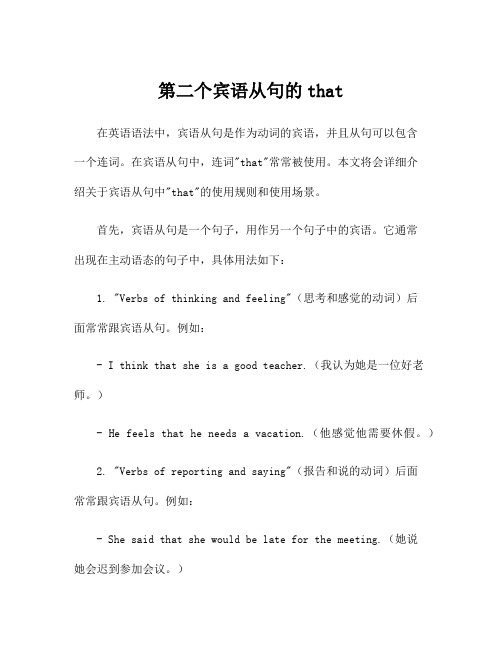
第二个宾语从句的that在英语语法中,宾语从句是作为动词的宾语,并且从句可以包含一个连词。
在宾语从句中,连词"that"常常被使用。
本文将会详细介绍关于宾语从句中"that"的使用规则和使用场景。
首先,宾语从句是一个句子,用作另一个句子中的宾语。
它通常出现在主动语态的句子中,具体用法如下:1. "Verbs of thinking and feeling"(思考和感觉的动词)后面常常跟宾语从句。
例如:- I think that she is a good teacher.(我认为她是一位好老师。
)- He feels that he needs a vacation.(他感觉他需要休假。
)2. "Verbs of reporting and saying"(报告和说的动词)后面常常跟宾语从句。
例如:- She said that she would be late for the meeting.(她说她会迟到参加会议。
)- They reported that the project is going well.(他们报告说这个项目进展顺利。
)3. "Verbs of knowing and wanting"(了解和希望的动词)后面常常跟宾语从句。
例如:- I know that he is coming to the party.(我知道他要来参加派对。
)- She wants to believe that everything will be fine.(她希望相信一切都会好起来。
)此外,宾语从句中的连词"that"在很多情况下是可选的,可以省略。
例如:- He said (that) he would meet me at the restaurant.(他说他会在餐厅见我。
高考英语二轮复习语法突破:名词性从句
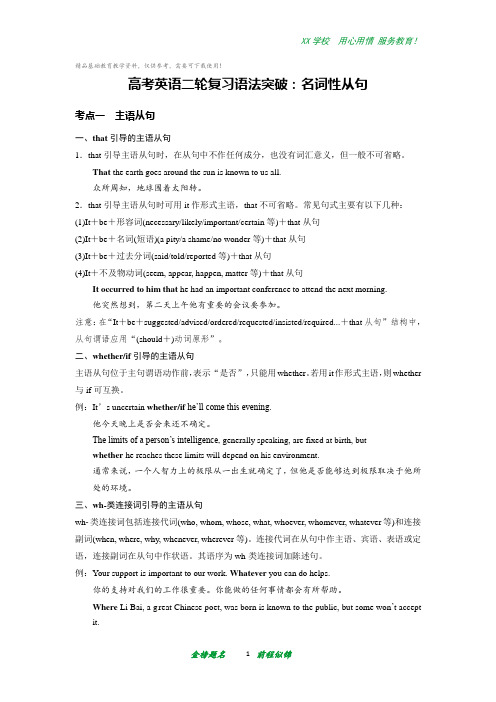
精品基础教育教学资料,仅供参考,需要可下载使用!高考英语二轮复习语法突破:名词性从句考点一主语从句一、that引导的主语从句1.that引导主语从句时,在从句中不作任何成分,也没有词汇意义,但一般不可省略。
That the earth goes around the sun is known to us all.众所周知,地球围着太阳转。
2.that引导主语从句时可用it作形式主语,that不可省略。
常见句式主要有以下几种:(1)It+be+形容词(necessary/likely/important/certain等)+that从句(2)It+be+名词(短语)(a pity/a shame/no wonder等)+that从句(3)It+be+过去分词(said/told/reported等)+that从句(4)It+不及物动词(seem, appear, happen, matter等)+that从句It occurred to him that he had an important conference to attend the next morning.他突然想到,第二天上午他有重要的会议要参加。
注意:在“It+be+suggested/advised/ordered/requested/insisted/required...+that从句”结构中,从句谓语应用“(should+)动词原形”。
二、whether/if引导的主语从句主语从句位于主句谓语动作前,表示“是否”,只能用whether。
若用it作形式主语,则whether 与if可互换。
例:It’s uncertain whether/if he’ll come this evening.他今天晚上是否会来还不确定。
The limits of a person’s intelligence, generally speaking, are fixed at birth, butwhether he reaches these limits will depend on his environment.通常来说,一个人智力上的极限从一出生就确定了,但他是否能够达到极限取决于他所处的环境。
英语实用手册:宾语从句(二)

英语实用手册:宾语从句(二)学习宾语从句要抓住三要素:连接词、语序和时态。
1.连接词连接词一般都是that(指事务或人),which(指事),who(指人)1.从句为陈述句,常选择连接词that或将that省略,直接与主句相连。
2.从句为一般疑问句,常选择连接词if或whether。
在whether …or not 结构中不能用if 替换。
3.从句为特殊疑问句,常选择what,when,where,which,who,how等的疑问代、副词作连接词。
注意:当who为主语时,句式为:who+谓语+其他2.判断时态情况:1.主句是一般现在时,从句为各种时态情况。
2.主句是一般过去时,从句为各种相应过去时态注意:从句描绘客观事实,用一般现在时。
eg:1. The teacher told the children that the sun____ round。
A. wasB. isC. wereD. are2. I believe that our team____ the basketball match。
A. winB. wonC. will winD. wins3. I don’t know____ to visit the old man。
A. whetherB. ifC. thatD. who4.The soldiers soon reached( )was once an old temple( )the villagers used as a school。
A.which;whereB.what;whichC.where;whichD.what;where答:选B,动词reach后接宾语从句,从句缺少宾语,where不可,which引导宾语从句时表疑问含义“哪一个…”而此句中并非疑问含义,不知道哪一座庙宇,而是用what从句表陈述含义,意“过去的一座旧庙宇”;temple后为对其修饰的定语从句,用关系代词which 代替,并在从句中作动词used的宾语,use sth. as…“把…用作…[编辑本段]宾语从句(版本三)宾语从句,在复合句中作宾语,位于及物动词后。
牛津译林版九年级英语上册Unit2宾语从句讲解
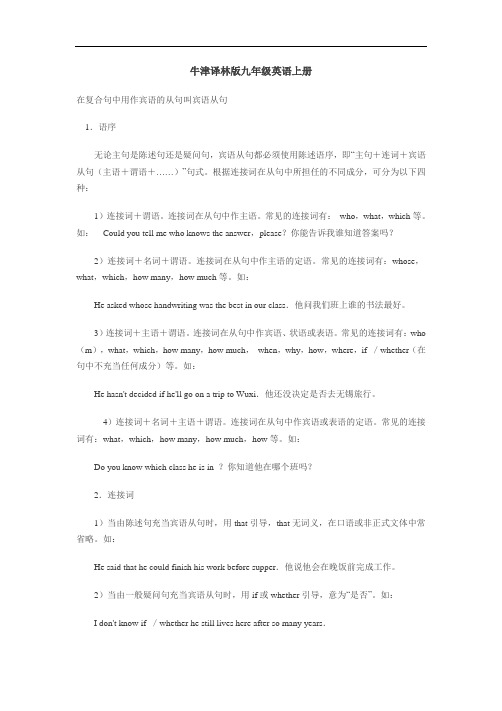
牛津译林版九年级英语上册在复合句中用作宾语的从句叫宾语从句1.语序无论主句是陈述句还是疑问句,宾语从句都必须使用陈述语序,即“主句+连词+宾语从句(主语+谓语+……)”句式。
根据连接词在从句中所担任的不同成分,可分为以下四种:1)连接词+谓语。
连接词在从句中作主语。
常见的连接词有:who,what,which等。
如:Could you tell me who knows the answer,please?你能告诉我谁知道答案吗?2)连接词+名词+谓语。
连接词在从句中作主语的定语。
常见的连接词有:whose,what,which,how many,how much等。
如:He asked whose handwriting was the best in our class.他问我们班上谁的书法最好。
3)连接词+主语+谓语。
连接词在从句中作宾语、状语或表语。
常见的连接词有:who (m),what,which,how many,how much,when,why,how,where,if /whether(在句中不充当任何成分)等。
如:He hasn't decided if he'll go on a trip to Wuxi.他还没决定是否去无锡旅行。
4)连接词+名词+主语+谓语。
连接词在从句中作宾语或表语的定语。
常见的连接词有:what,which,how many,how much,how等。
如:Do you know which class he is in ?你知道他在哪个班吗?2.连接词1)当由陈述句充当宾语从句时,用that引导,that无词义,在口语或非正式文体中常省略。
如:He said that he could finish his work before supper.他说他会在晚饭前完成工作。
2)当由一般疑问句充当宾语从句时,用if或whether引导,意为“是否”。
that引导两个宾语从句
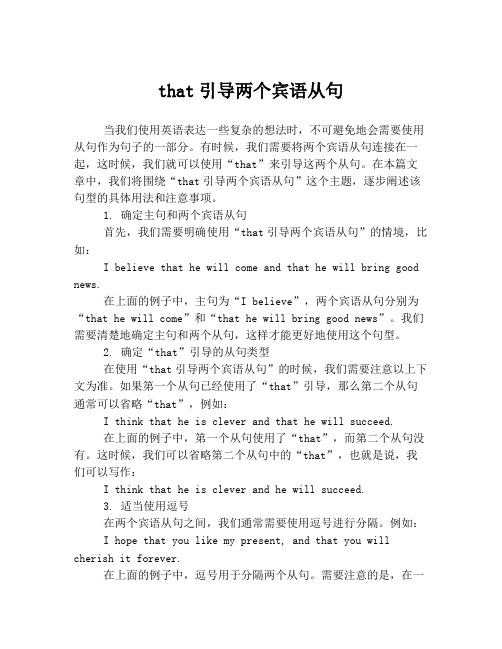
that引导两个宾语从句当我们使用英语表达一些复杂的想法时,不可避免地会需要使用从句作为句子的一部分。
有时候,我们需要将两个宾语从句连接在一起,这时候,我们就可以使用“that”来引导这两个从句。
在本篇文章中,我们将围绕“that引导两个宾语从句”这个主题,逐步阐述该句型的具体用法和注意事项。
1. 确定主句和两个宾语从句首先,我们需要明确使用“that引导两个宾语从句”的情境,比如:I believe that he will come and that he will bring good news.在上面的例子中,主句为“I believe”,两个宾语从句分别为“that he will come”和“that he will bring good news”。
我们需要清楚地确定主句和两个从句,这样才能更好地使用这个句型。
2. 确定“that”引导的从句类型在使用“that引导两个宾语从句”的时候,我们需要注意以上下文为准。
如果第一个从句已经使用了“that”引导,那么第二个从句通常可以省略“that”,例如:I think that he is clever and that he will succeed.在上面的例子中,第一个从句使用了“that”,而第二个从句没有。
这时候,我们可以省略第二个从句中的“that”,也就是说,我们可以写作:I think that he is clever and he will succeed.3. 适当使用逗号在两个宾语从句之间,我们通常需要使用逗号进行分隔。
例如:I hope that you like my present, and that you will cherish it forever.在上面的例子中,逗号用于分隔两个从句。
需要注意的是,在一些情况下,我们也可以直接使用“and”连接两个从句,而不需要使用逗号。
例如:I know that he is busy and that he has a lot of work to do.这时候,从句之间使用“and”连接即可。
宾语从句(二)

= Can you tell me where to get a dictionary?
1. —Can you tell me ________ to London? —Sure. Next month. A. when you will travel B. when will you travel C. when you travelled D. when did you travel (2015 北京)
指路的常用英语表达: 1. Go along this street, and … is on your left. 2. Go down this way, and turn left at the first crossing, and you’ll find … is right there, on your left.
4b
What should each person ask in the following situations?
1. Tim is very hungry.
Could you tell me where I can get something to eat? Excuse me, can you tell me how I can get to a nearby restaurant? Pardon me, do you know if there is a restaurant around here?
转换 当宾语从句中的主语与主句的主语或宾 语一致时,可使用“关联词+动词不定式(短
语)”结构对从句进行改写。如:
I really don’t know which book I should buy.
= I really don’t know which book to buy.
宾语从句人称变化一随主,二随宾

宾语从句人称变化一随主,二随宾语从句是由一个动词或介词引导的句子,在句子中充当名词的角色。
在宾语从句中,句子的主语和谓语通常会有一定的变化规律,具体如下:一、随主变化当宾语从句的主语和主句的主语不一致时,宾语从句的谓语动词要根据主句的主语而变化,从而使整个句子构成语法上完整的意义。
例如:1. She said she likes chocolate.(她说她喜欢巧克力。
)2. Tom asked me if I would like to go to the party.(汤姆问我是否愿意去参加聚会。
)3. My boss told us that we need to work harder.(我的老板告诉我们需要更加努力工作。
)在以上句子中,宾语从句的谓语动词likes、would like to和need在人称和数上都随着主句的主语而变化。
比如,在第一个句子中,当she和likes在一起时,主句的主语和宾语从句的主语不一致,因此likes要变成第三人称单数形式。
二、随宾变化当宾语从句的主语和主句的主语一致时,宾语从句的谓语动词就要根据宾语从句的主语而变化,而不是主句的主语。
例如:1. I think I need a break.(我认为我需要休息。
)2. She said she wanted to buy a new car.(她说她想买一辆新车。
)在以上句子中,宾语从句的谓语动词need和wanted都是根据宾语从句的主语I和she而变化的,而不是根据主句的主语。
这是因为宾语从句的主语和主句的主语一致,因此谓语动词的形式要根据宾语从句的主语而变化。
Unit2宾语从句课件人教版英语九年级全册
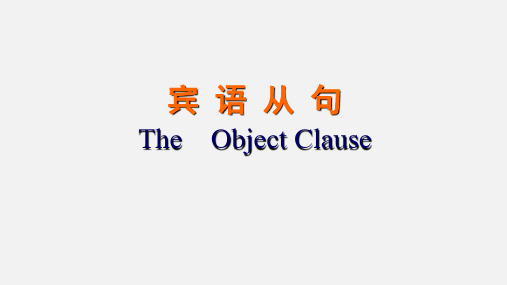
4. I hear they _h_a__ve__r_e_tu_r_n_e_d_ (return) it already. 5. He asked what they _w_e_r_e_d__o_in_g___ at eight last night.
❖Please tell me whom you’ll give the letter to . Please tell me whom to give the letter to .
宾语从句:在复合句中用作宾语的从句叫宾语从句 .
时态
1、主句为现在时,从句的时态可以为任何时态。 2、主句为过去时,从句的时态为过去时的一种。
He says
he will ask Jim a question. I am a good friend. he isn’t feeling well now. he came back last night. he has been here twice before.
2.如果主句是一般过去的时态,那么从句的 时态要用相对应的过去时态。
2. 当宾语从句是一般疑问句时,由连词whether或 if引导,if/whether翻译为:“是否”,具有一 定的意义,不能省略。
Do you know if/whether the students had a picnic last Sunday ?
If 与whether 的区别
与or not 连用只能用whether 不管......还是 无论......还是
九年级英语人教版 Unit 2 宾语从句讲解

宾语从句宾语:动作的承受者,一般置于及物动词之后(动宾结构);或不及物动词之后(介宾结构)I know Sun Yang.宾语从句定义:在复合句中,由一个句子充当宾语,这个句子叫做宾语从句。
由“引导词+主语+谓语...”构成,引导词在从句中作主语除外。
I know tha Sun Yang is a great swimmer.宾语从句考点:(1)引导词(2)语序(3)时态牛刀小试:4b Read the passage below and underline the objective clauses.Dear Xia Yu,Do you know that there are two special days for parents in America? One is Mother’s Day on the second Sunday of May and the other is Father’s Day on the third Sunday of June. On these two days, American children often give gifts to their parents or take them out for lunch or dinner. Common gifts are flowers and cards for mothers and shirts or ties for fathers. I heard that it is becoming more and more popular to celebrate Mother’s Day and Father’s Day in China. I wonder if children over there also give similar gifts to their parents. I believe that there are many ways to show our love. Actually, we don’t have to spend a lot of money. It is also a good idea to help parents to do something instead.June一、宾语从句的引导词1.由从属连词that 引导的宾语从句(陈述句)that 在句中无词汇意义,在从句中不能充当成分,只在宾语从句中起连接作用,在口语当中往往省略。
中职英语第二册unit2宾语从句

改red...
Will Miss Li be in charge of our class?
The students wondered if Miss Li would be in charge of our class.
改为宾语从句 He didn’t say… What did Father Christmas put in his stocking? He didn’t say what Father Christmas had put in his stocking.
1.that属于从属连接词,在宾语从句中没有实际意义,只 是起引导从语的作用。
1)作动词的宾语从句 We all know (that) success calls for hard work. 我们都知道成功需要付出艰辛的劳动。 We knew (that) he had made a mistake. 我们知道他犯了一个错误。 2)在某些be+形容词的结构后面也可以跟that引导 的宾语从句。 如sure, certain, glad, pleased, happy, afraid, surprised, sorry等。 I am sure that I have posted the letter. 我的确把那封信寄了。 I am afraid that you are right. 恐怕你是对的。
Object
She
主语
did the work herself.(Noun名词)
谓语 宾语
I
called him. (Pronoun代词) The young man offered to carry the suitcase for Grandma.
宾语从句 (2)

宾语从句一、如何变人称; 遵从一主二宾三不变一主:从句的第一人称随_____句的主语变化。
eg:“I have bought an expensive car , ” said the boss.→The boss said he had bought an expensive car.二宾:从句的第二人称随主句的______语变化。
eg:I often tell him , "You are the luckiest boy I have ever seen . " → I often tell him he is the luckiest boy I have ever seen . “三不变:从句的第三人称不需要变化。
二如何变时态:(1)一般现在时变为__________时(2)现在实行时变为__________时(3)一般将来时变为__________时(4)现在完成时变为__________时(5)一般过去时变为__________时(6)过去完成时不变,仍为________时①直接引语是_____________时态不变.如:"The earth moves around the sun and the moon moves around the earth, the teacher told me. → The teacher told me the earth moves around the sun and the moon moves around the earth。
②直接引语是______________时态不变。
如:Jack said. “John, where were you going when I met you in the street?”→Jack asked John where he was going when he met him in the street。
U2宾语从句

2.重点:只用 用if, whether whether 填空。 不用if
1. I don’t know whether _____ he will come or not. ①whether..or not ②介词 +whether whether 2. That depends on _______ he can come ③whether to do back. ④Whether位于句首 3. He wondered _________ to stay here the next week. whether Whether 4. _________
1)语序不变情况:
宾语从句为下列句子及who/ what做主语时
1) What’s wrong/ the matter/ the trouble with sb.? 2) What happened to sb.? 3) Which is the way to sw.? 4)Can you tell me who is over there?
I think that moon cakes are delicious! 在复合句中,由一个句子 ___________充当宾语,这个句子叫 作宾语从句。
考点一:关联词
that English is easy. I believe (that) that Miss Li teaches English. We know (that) I wonder if Miss Li lives in ChaoYang. Miss Li wants to know whether her students like her class (or not). Do you know how I learned to learn English? Don’t ask me when the class will be over.
realize后面接两个宾语从句的例子(二)
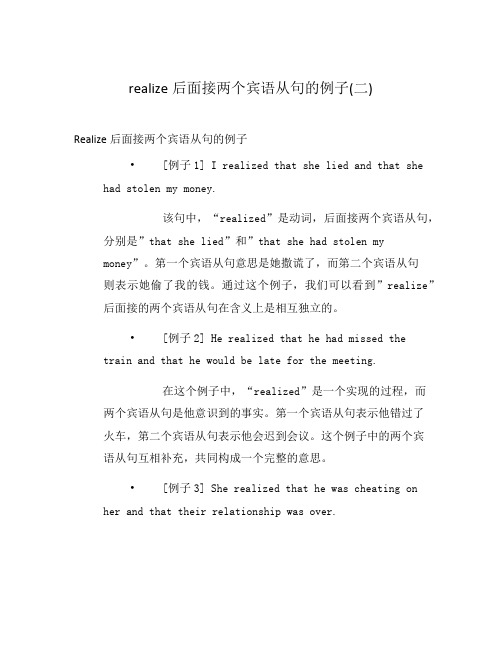
realize后面接两个宾语从句的例子(二)Realize后面接两个宾语从句的例子•[例子1] I realized that she lied and that she had stolen my money.该句中,“realized”是动词,后面接两个宾语从句,分别是”that she lied”和”that she had stolen mymoney”。
第一个宾语从句意思是她撒谎了,而第二个宾语从句则表示她偷了我的钱。
通过这个例子,我们可以看到”realize”后面接的两个宾语从句在含义上是相互独立的。
•[例子2] He realized that he had missed the train and that he would be late for the meeting.在这个例子中,“realized”是一个实现的过程,而两个宾语从句是他意识到的事实。
第一个宾语从句表示他错过了火车,第二个宾语从句表示他会迟到会议。
这个例子中的两个宾语从句互相补充,共同构成一个完整的意思。
•[例子3] She realized that he was cheating on her and that their relationship was over.这个例子中,“realized”意味着她意识到了他在出轨,并且他们的关系已经结束了。
这两个宾语从句相互呼应,构成了一个情感上包容的事实。
•[例子4] They realized that they were running out of time and that they needed to speed up.在这个例子中,“realized”表达了他们意识到时间不够了,并且他们需要加快速度。
这两个宾语从句互相补充,以强调他们需要行动的紧迫感。
通过以上几个例子,我们可以看到”realize”后面接两个宾语从句时,它们可以是相互独立的事实,也可以是相互补充的事实。
宾语从句(二) 配套课件

特殊情况 He told me The earth is round.
He told me that the earth is round.
客观真理
The teacher said The moon goes around the earth.
The teacher said that the moon goes around the earth. 自然现象
当从句说明的是客观真理、自然现象时,从句永 远用一般现在时。
单项选择
即时练习
1. Let me tell you ______D____________.
课堂小结
宾语从句(2)
宾语从句的语序 宾语从句的时态
A. how much is the car
B. how much does the car cost
C. how much did I pay for the car D. how much I spent on the car
2. She told me the sun ___C___ in the east.
He wants to know if Mary will go swimming. 当宾语从句的主句是一般现在时时,从句的时态根 据实际情况而定。
宾语从句的时态
I didn’t know What are they doing?
I didn’t know what they were doing. He wanted to know Will Mary go swimming?
realize后面接两个宾语从句的例子(一)
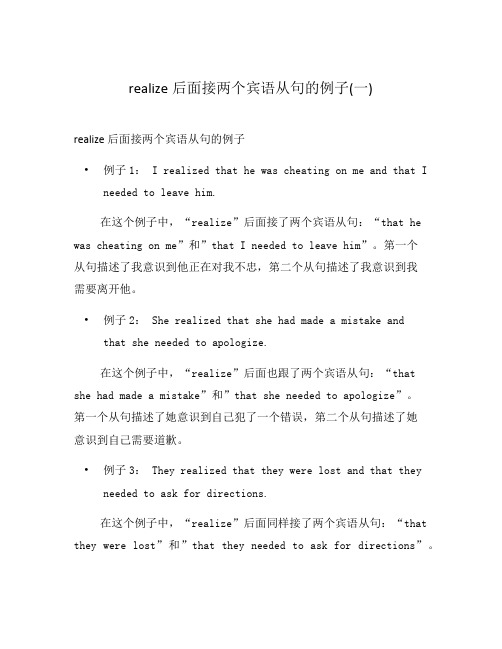
realize后面接两个宾语从句的例子(一)realize后面接两个宾语从句的例子•例子1: I realized that he was cheating on me and that I needed to leave him.在这个例子中,“realize”后面接了两个宾语从句:“that he was cheating on me”和”that I needed to leave him”。
第一个从句描述了我意识到他正在对我不忠,第二个从句描述了我意识到我需要离开他。
•例子2: She realized that she had made a mistake and that she needed to apologize.在这个例子中,“realize”后面也跟了两个宾语从句:“that she had made a mistake”和”that she needed to apologize”。
第一个从句描述了她意识到自己犯了一个错误,第二个从句描述了她意识到自己需要道歉。
•例子3: They realized that they were lost and that they needed to ask for directions.在这个例子中,“realize”后面同样接了两个宾语从句:“that they were lost”和”that they needed to ask for directions”。
第一个从句描述了他们意识到自己迷失了方向,第二个从句描述了他们意识到自己需要寻求帮助。
在这些例子中,“realize”表示人们意识到某个事实或情况,并且通过两个宾语从句来详细说明他们意识到的具体内容。
第一个宾语从句通常描述了他们意识到的问题或状况,而第二个宾语从句通常描述了他们意识到的应对或行动。
这种结构可以帮助表达逻辑清晰且有层次感的观点。
- 1、下载文档前请自行甄别文档内容的完整性,平台不提供额外的编辑、内容补充、找答案等附加服务。
- 2、"仅部分预览"的文档,不可在线预览部分如存在完整性等问题,可反馈申请退款(可完整预览的文档不适用该条件!)。
- 3、如文档侵犯您的权益,请联系客服反馈,我们会尽快为您处理(人工客服工作时间:9:00-18:30)。
否定前移
• 1.由动词suppose, guess,believe, think , 和形容 词sure 引导的宾语从句中出现否定时,否定形式 要进行前移,形式上时否定了主句,实际上是否 定了宾语从句。即主句的谓语动词用否定式,而 从句的谓语动词用肯定式。 • I don't think I know you. 我想我并不认识你。 • I don' t believe he will come. 我相信他不回来。
宾语从句
宾语从句是一种名词性从句,是主从复合句的一种. 宾语从句是一种名词性从句, 在句中作及物动词 介词或形容词的宾语 在句中作及物动词或介词或形容词的宾语。主从复 动词或 合句是 由一个主句和一个或一个以上的从句构成的。 主句是复合句的主体,从句仅仅是主句的一个 成分,它从属于主句,不能独立。从句在全句中 充当什么成分,就叫什么从句。宾语从句当中的 从句在全句中作宾语。
在以下八种情况中that不能省略 在以下八种情况中that不能省略
• 1.当句中的动词后接多于两个由that引导的 宾语从句时,第一个that可省,但后面的 that不可省。 • He said (that) the book was very interesting and that(不省略) all the children like to read it.他说那本书很有趣,所有小孩 都喜欢读。 • He said (that) you were too young to understand the matter and that he was asked not to tell you.
• 3) 有时将动名词,介词短语或整个从句的否定转 变为对谓语动词的否定。 • I don't remember having ever seen such a man. • 我记得从未见过这样一个人。 (not否定动名词短 语 having…) • It's not a place where anyone would expect to see strange characters on the street. • 在这里,人们不会想到在街上会碰上陌生的人。 • (anyone 作主语,从句中的谓语动词不能用否定 形式。)
当if和whether(表示“是否”)引导宾 if和whether(表示“是否”) 语从句时,应注意以下几种情况:
• 1.介词之后的宾语从句,只能用whether连 接,而不用if。 • ①This depends upon whether we are determined to do it. 这件事要看我们是否有 决心去做。 • ②It depends on whether he is ready. 这件 事要看他是否有准备。 • ③I am not interested in whether you'll come or not. 你来不来我不感兴趣。
• 2)如果主句的谓语动词是过去时 过去时,宾语从 过去时 句的谓语动词只可根据需要,选用过去时 态即一般过去时、过去进行时、过去将来 一般过去时、 一般过去时 过去进行时、 时或过去完成时的某一种形式 • 孩子们不知道他是谁。 The children didn’t know who he was.
• • • •
他说他会在晚饭前完成工作。 I hear (that) _______________________. (一小时后他会回来) He said (that) _____________________. (他非常想念我们) The teacher told us (that) ___________________地球围着太阳转)
三 时态是指宾语ቤተ መጻሕፍቲ ባይዱ句的主句时态分 为两种时态
• 谓语动词的三种情况 1.主句用一般现在时,从句可用任意时态。 2.主句用过去时,从句用过去某个时态。 3.主句用过去时,从句是真理时,只用一 般现在时。
主、从句谓语动词的时态呼应应包 括以下三点内容:
• 1)如果主句的谓语动词是一般现在时 一般现在时,从 一般现在时 句的谓语动词可根据需要,选用相应的任 何时态。 • 我不知道他将何时回来。 I don’t know when he will come back.
• 4. 在“it(形式宾语)+补语”之后时。 如: • I think it necessary that he should stay here. 我们认为他有必要留在这里。
• 5. 在介词except, but, besides, in等后面跟 that引导的宾语从句时,不能省略 • The Swede stood quite still, except that his lips moved slightly. • 那个瑞典人站着一动不动,只是嘴巴还微 微在动。 • He has no special fault except that he smokes too much.他除了抽烟太多之外,没 有什么特别的毛病。
• 3)如果宾语从句所表示的是客观事实、普 遍真理、自然现象或习惯性动作等,不管 主句用什么时态,从句时态都用一般现在 一般现在 时。 • 老师说地球绕着太阳转。 The teacher said the earth goes around the sun.
三要素:时态,语序,引导词
• • • • • 类型是指: A:由that 引导的宾语从句。 B:由疑问词引导的宾语从句。 C: 由if \ whether引导的宾语从句。 D:由情感形容词引导的宾语从句。(其中 介词引导的宾语从句包含其中)常用的情 感形容词有:sure, afraid ,glad ,pleased ,happy ,worried ,sad , sorry
• 2.宾语从句前有插入语。如: • We hope, on the contrary, that he will stay at home with us. 恰恰相反,我们希望他和 我们呆在家里。
• 3.有间接宾语时,也就是当that从句是 双宾语中的直接宾语时,that不可省。 • He told me that he was leaving for Japan. 他告诉我他要去日本。 • I can’t tell him that his mother died.
• 8.that引导的宾语从句位于句首时 • That she ever said such a thing I simply don’t believe, • 我只是不相信她曾经说过这样一件事情。 • That our team will win, I believe. 我相信我 们队会赢。
• 2. 由连接代词who, whom, whose, what, which 和连接副词when, where, why, how引导的宾语 从句。这些连接代词和连接副词在宾语从句中 充当某个成分。 • Do you know who (whom) they are waiting for? • He asked whose handwriting was the best. • Can you tell me where the No.3 bus stop is? • I don't know why the train is late.
• 2. 将seem, appear 等后的从句的否定转移 到前面。 It doesn't seem that they know where to go. • 看来他们不知道往哪去。 • It doesn't appear that we'll have a sunny day tomorrow. • 看来我们明天不会碰上好天气。
• 3. 由if或whether引导的宾语从句。If和 whether在句中的意思是"是否"。 • I want to know if (whether) he lives there. • He asked me whether (if) I could help him.
• • • •
1我不知道这么多年后他是否还住在这儿。 2. I want to know __________________. 他是否跟我们一起去公园) 3. Ask him _____________________. (他是否能来) • 4. I don’t know __________.(是否要下雨)
• 6.宾语从句为主从复合句且从句位于主语之时, • He said that if he came back early , he could come for the meeting. • 他说,如果早回来的话,他会来参加会议的。 • 7.当when,who,where,why等引导的从句和 that引导的从句作主句谓语动词的并列宾语时 • I know what the time is and that the wind remains low. • 我知道现在是什么时候,且风仍然不大
• 2.宾语从句中的whether与or not直接连用时, 就不能换成if。 • 3在动词不定式之前,只能用whether,不 能用if。 • ①He doesn‘t know whether to stay or not. 他不能知道是否要留下来。 • ②She doesn't knows whether to get married now or wait. 是否现在结婚或是等 待她不知道。
根据引导宾语从句的不同连词,宾 语从句可分为三类。
• • • • • 由that引导(that在口语或非正式文体中 常省略)。 由连接代词 Who,whom,whose,which, what 和连接副词 where,how,why,when 引导。 由连词whether或if引导(口语中常用if)。
• 6宾语从句是否定句时,只能用if,不用 whether。 • 7.引导主语从句和表语从句 主语从句和表语从句时只用whether。 主语从句和表语从句 • 8.若用if会引起歧义 会引起歧义时,则用whether 会引起歧义 • Please let me know if you like the book. • 可理解为:
